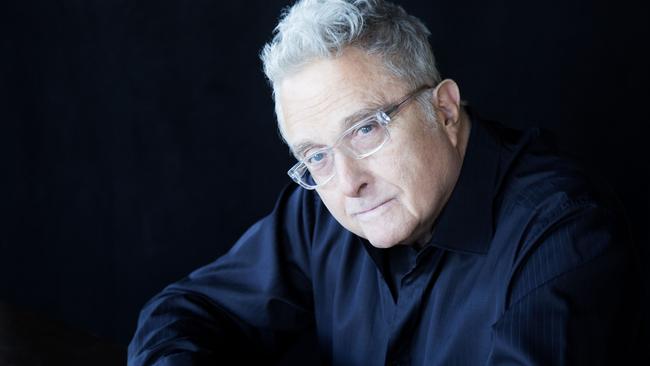Randy Newman: a friend in him
Musician Randy Newman discusses the political and emotional impact of his songs ahead of the Oscars.

Musician Randy Newman discusses the political and emotional impact of his songs ahead of the Oscars.
-
What are you listening to at the moment?
I bought over the years this series of albums, the greatest pianists of the century, I guess — the 20th century, when I bought it. They have Solomon, who was a pianist in the 20s and 30s, 40s. Just recently I started listening to those again. There was a time when classical music and classical musicians actually sold records. And believe it or not, guys became famous for being on the radio, like Toscanini, Horowitz, Rubinstein. I was listening to some of that stuff and they had something different … some kind of magic, I feel that way about the Beatles, from some of their early stuff, like how the hell did they get there? I tend to over-analyse music. I’ve never actually gone to it for relaxation or enjoyment. I listen hard. If something's real good it depresses you a little bit. If something's bad it's boring.
Podcasts?
I listened to this baseball one ’cause I'm interested in baseball. I listen to Political Gab Fest. I listened to political things: This American Life, Against the Rules with Michael Lewis. These guys are looking at things you see every day but they see them differently. They have real intelligence, (Malcolm) Gladwell (Revisionist History) and Lewis.
I was listening to 1619 by The New York Times at the weekend. It made me think of your song Sail Away because it also revisits some of the assumptions that we might have about slavery.
Yeah, it’s kind of overdue. It’s great. It’s like the great days of radio but better, all these podcasts.
Maybe scoring a podcast should be your next project? Hans Zimmer just did that with the BBC’s 13 Minutes to the Moon for the 50th anniversary of the Apollo landing.
I don’t know about that. I’d rather listen to them, but you never know.
Your latest album (is called) Dark Matter, what do you think makes up the universe?
I had a theory that maybe, (based on) no knowledge at all, that, you know, things like dark matter, they don’t know what it is. They know where it is but they don’t know what it’s made of or what it’s doing. That it may be the product of another universe, right? (Laughs) I can’t believe I’m exposing this theory. But that another universe that has different physics that has a different set-up, that we can’t perceive yet. But I’m willing to be proven wrong.
What’s your prime mover in the universe? What compels you?
It’s work. There’s real moments but I like being able to think that I am productive and that I’m really good at what I do, whether it’s writing songs or doing scores for movies. And it is a shaky proposition for me. I don’t always have that kind of confidence, even though I’ve done it so many times. But I wish I had, you know, I wish I had more confidence about it all. But that’s what moves me, I think.
Why did you release (the song) Putin earlier than the rest of Dark Matter?
I was excited about it. I thought it was really funny. People really like it. So we put it out. There was no business reason for doing it. I was excited and wanted to see what people would think of it.
You’ve had political tones in your work since the song Political Science (in 1976). You spared Australia lyrically, thank you very much for that. Our Prime Minister, Scott Morrison, and President Trump … do you have any advice for them in better understanding each other? Listen to You've Got a Friend in Me?
(Morrison) Keep his hand on his wallet. (Trump) He’s not a nice man. He’s not a smart man. He’s depressing as a representative of our country. What’s depressing is that so many nice people back him. So many nice people wouldn’t have him on their bowling team or wouldn’t want him as a friend, but they vote for him. It is a sad commentary on the country.
I really liked your discussion of Good Old Boys with Malcolm Gladwell (Revisionist History podcast) about Rednecks, the song. And the letter you got from the young black man in Lafayette (Louisiana) and how that made you think differently.
It did and it didn’t. I didn’t regret writing the song and I didn’t regret playing it that night. But I understood that it’s just a greater lesson that people don’t always know where you’re coming from. And in my songs words don’t always mean exactly what they say. You know, you’re not supposed to trust a lot of guys in my songs. The narrator is untrustworthy. And this guy, the guy in Rednecks, it’s a complicated thing, he is sort of untrustworthy but some of what he says is true. It’s like people aren’t all bad, you know. Racists, are all bad, but it has gradations.
Do you think because that kind of song like Rednecks possibly couldn’t be made today that we’re missing out on some sort of nuance?
I don’t think it could be. I mean, I might do something like that again. But now, I think now, that kind of language, maybe rightfully, so to some extent it would just chafe people that you couldn’t do it. It would be just too big a deal.
You’re from New Orleans, you were born there and I think that song, listening to it, was really worthwhile and made me think differently about Louisiana, about southern hospitality.
People there they say, ‘How's it goin’?’. And they actually care how it’s goin’. But … they don’t like being told what to do. And they see that all their problems go back to, you know, losing the war. I mean, it’s a funny thing, to have that kind of hospitality and yet be backward, in my opinion, politically.
Your song Louisiana 1927 became an unofficial anthem for New Orleans after Hurricane Katrina in 2005, and with the Princess and the Frog soundtrack you sing about what’s uplifting about culture, despite the catastrophe of whether it’s racism or hurricanes.
Well, the thing down there, it sort of, it was an integrated thing, kind of, as much as the South got, the development of the music. But it’s pretty lively and makes you smile, that kind of music. It does me. You know, Fats Domino, Louis Armstrong. And so in that movie, there’s a funeral, and I wanted to play it slow like I know they do there. Slow going and fast coming back. So I did that. And they wanted everything authentic. But when they, I guess when they showed it to an audience, they didn't want that fast music going out. It was just like wrong. So I had to play straight like a stately kind of hero. It wasn’t right but maybe it was right for the audience. I don’t know.
That’s not how they do it down there, it’s about sadness and celebration.
Yeah, slow going and fast coming back. Or maybe the other way around, I forget.

You’re known for your work on Toy Story. What’s it like coming back for number 4? Not many people get to work on projects that span decades.
What’s nice, because this music you can use again, you know, is that this one has a lot of emotional sort of content. There were 10-12 minutes where you had to keep the ball in the air. You know, keep the emotional line going. That worried me but I think it came out all right. There's a lot of running around in animated pictures. When Tom Hanks was around in the movie, you don't necessarily have to go (Newman makes a sound with his mouth like running his fingers across piano keys), but when he runs around as Woody, you gotta go (running across piano keys sound).
When you sing You’ve Got a Friend in Me, is there a particular friend you’re thinking of? Are you thinking of Woody, Buzz and Andy?
And the money I was going to get for it (laughs). No, I was thinking of Woody and Andy. I was thinking of what they tell me they want, to be a song about friendship, this particular friendship.
What were you thinking of when you are writing I Will Go Sailing No More, where Buzz tries to fly? It’s pretty heartbreaking. When you watch something like that, even when I watched it as a kid and listening to it now, you’re not thinking of Buzz and failing, you’re thinking of your own life.
Oh yeah, where he jumps off the balcony? Yeah, well, that’s good. I wrote another song for that. It’s going to sound callous now but it had things in it like “Made in Taiwan”. It was sad but it was also a little funny. They said the characters in these (movies) are adults and they take their emotions seriously. And I guess it is serious when a guy jumps off a banister like that. So I did. And I’ve always remembered what John Lasseter (the director) said about the emotions, because that’s what they care about in those movies. The jokes they get you every time, you know, and they worry about having some emotional constant appeal. Heart, I guess you could call it.
In your song Marie, you’re narrating a character singing to his sleeping wife. He can’t articulate his feelings for her while she’s awake. I think a lot of people are at a loss for words, listening to your music helps express that. Does it come out easy for you, the words? Putting it into the microphone or the keys of the piano?
Yeah, that’s, that’s a good idea. I should do that again. Sure they are, in situations like that. I know that I am absolutely glib in those situations. It doesn’t come easy to me to say, necessarily. The thing is, like I haven’t written more songs like that. For whatever reason I have fewer love songs per hundred songs than any pop writer I can think of. The area that people really like is, you know, 90 per cent love songs, but I choose to not do that. Whether that has to do with shyness or (something else). I don’t know. But I'm more interested in writing about people who are a little (off-centre). I probably should have written more love songs.
What I particularly liked about it is the character is flawed. And not being able to say how you feel is perhaps the greatest flaw. Your music helps us articulate the things we can’t say ourselves.
That’s nice to hear, thank you. I love you very much and you mean the world to me (laughs).
-
The 92nd Academy Awards are on February 10, 2020. Randy Newman is up for two Oscars for Best Original Song (Toy Story 4) and Original Score (Marriage Story). He has been nominated for 20 Oscars for his songwriting and composing and he’s won twice for Monsters, Inc. and Toy Story 3.



To join the conversation, please log in. Don't have an account? Register
Join the conversation, you are commenting as Logout